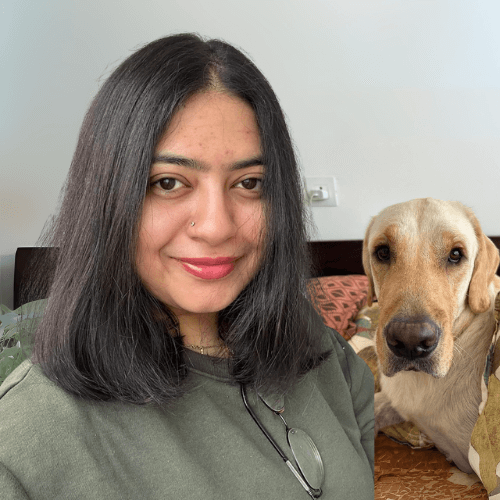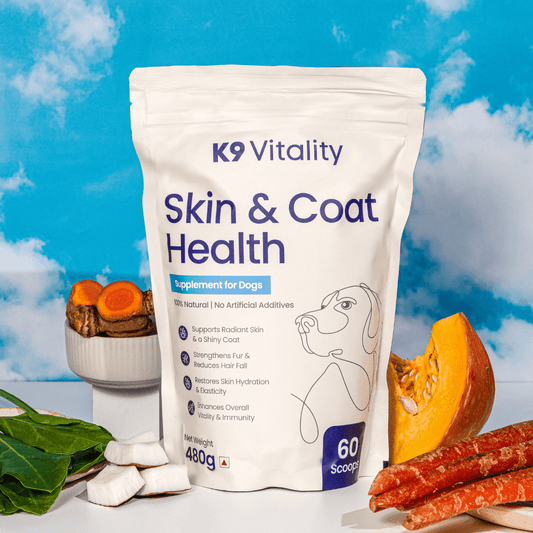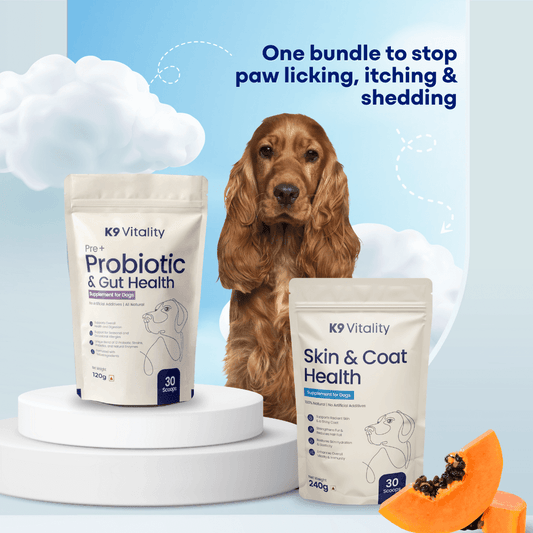
Why Is My Dog Scratching Non-Stop? Common Causes and How to Help
Share
Is Your Dog Scratching All the Time? Here's What It Might Mean
You watch your dog and notice it, again. That familiar scratching, licking, or chewing that seems to happen all day long. It’s not just once or twice, it’s constant.
As a loving pet parent, it’s heartbreaking to see your furry friend in obvious discomfort. You wonder, “Is it just dry skin? Could it be fleas? What if it’s something serious?”
The truth is, persistent itching in dogs is incredibly common and incredibly misunderstood. Scratching is a symptom, not a diagnosis. Without identifying the cause, relief is temporary, and the problem often comes back worse.
That’s why we created this guide. At K9 Vitality, we believe pet parents deserve answers—and dogs deserve comfort. Whether your pup is dealing with fleas, allergies, or stress, we’ll help you:
- Understand the most likely reasons for constant scratching
- Recognize signs of when it's time to take action
- Learn practical ways to soothe your dog’s skin
- Discover long-term strategies to build healthier, happier skin
Because scratching doesn’t have to be the norm. Relief is possible and it starts with knowing what you’re dealing with.
Common Causes of Excessive Scratching in Dogs

1. Fleas and Mites (External Parasites)
What to Look For:
- Intense scratching or biting, especially around tail and neck
- Tiny black specks in fur (flea dirt)
- Red bumps, scabs, or skin inflammation
- Hair loss from constant biting
Why It Happens:
Fleas, ticks, and mites irritate the skin and can trigger allergic reactions in sensitive dogs.
What to Do:
- Use vet-approved flea/tick preventatives year-round
- Wash bedding, collars, and vacuum regularly
- See your vet for mange or tick-borne issues
2. Food Allergies
What to Look For:
- Chronic itching without visible fleas
- Red or inflamed skin on paws, ears, or belly
- Frequent ear infections or diarrhea
Why It Happens:
Some dogs develop hypersensitivities to common proteins (like beef or chicken), dairy, or grains.
What to Do:
- Try a vet-guided elimination diet
- Switch to hypoallergenic or limited ingredient food
- Monitor reactions closely
3. Environmental Allergies (Atopic Dermatitis)
What to Look For:
- Seasonal itching, especially spring/summer
- Red, itchy skin on belly, armpits, and paws
- Licking, chewing, or rubbing face and paws
Why It Happens:
Like humans, dogs can be allergic to pollen, mold, dust mites, or even grass.
What to Do:
- Rinse paws after walks
- Use air purifiers indoors
- Talk to your vet about allergy testing and medications
4. Dry Skin or Poor Nutrition
What to Look For:
- Dull coat, dandruff, flaky or tight skin
- Mild but persistent itching
Why It Happens:
Cold weather, frequent bathing, or a poor diet can strip oils from the skin.
What to Do:
- Use moisturizing, dog-safe shampoos
- Feed a diet rich in omega-3 and omega-6 fatty acids
- Add skin-support supplements
5. Fungal or Bacterial Infections
What to Look For:
- Greasy, smelly skin
- Redness, swelling, or oozing sores
- Circular hair loss patches
Why It Happens:
Overgrowth of yeast or bacteria, often secondary to allergies or poor grooming
What to Do:
- See your vet for accurate diagnosis
- Use medicated shampoos or oral meds
- Keep infected areas clean and dry
6. Stress or Behavioral Causes
What to Look For:
- Licking or scratching with no medical cause
- Signs of boredom, anxiety, or obsessive behavior
Why It Happens:
Dogs may groom excessively when anxious, under-stimulated, or left alone for long hours.
What to Do:
- Provide mental stimulation and exercise
- Try enrichment toys or puzzle feeders
- Consider anxiety aids or training support
When Should You Be Concerned?

Occasional scratching is normal. But non-stop or aggressive itching is a red flag. Contact your vet if:
- The scratching lasts more than a week
- You notice wounds, hair loss, or bleeding
- Your dog seems distressed or can't sleep
- There’s a strong odor or signs of infection
How to Help Your Dog: Relief Starts Here
To help your dog stop scratching and heal properly, follow a multi-step approach:
Immediate Relief
- Bathe with gentle, moisturizing or medicated shampoos
- Apply vet-recommended topical sprays or creams
- Prevent further scratching with an e-collar if necessary
Identify the Root Cause
- Check for fleas, mites, or ticks
- Discuss food and environmental allergies with your vet
- Rule out infections through proper testing
Long-Term Management
- Stick to a flea/tick prevention schedule
- Use air purifiers and rinse your dog's feet during allergy season
- Maintain a skin-healthy diet and supplement plan
Building Better Skin Health From Within
Scratching is just a symptom. The real solution lies in making your dog’s skin more resilient and less prone to irritation. That means feeding their skin from the inside out.
That’s why K9 Vitality’s Skin & Coat Health Supplement is such a game changer.
What It Does:
- Replenishes skin oils with omega fatty acids
- Reduces inflammation from allergies and dryness
- Supports coat shine, strength, and hydration
- Boosts immune defense against irritants and infections
Why It Matters:
Even with great grooming and flea control, dogs with weak skin barriers will keep scratching. The K9 Vitality supplement ensures long-term support from within.
Learn more here: Skin & Coat Health Supplement
Conclusion: K9 Vitality Has Your Back (and Your Dog’s Skin)
Your dog isn’t scratching just to annoy you. They’re telling you something’s wrong. And as their caregiver, it’s your opportunity to act, not just to stop the itch, but to address the reason behind it.
By uncovering the cause, whether it’s fleas, allergies, or something deeper, you can create a care plan that provides not only relief, but resilience.
K9 Vitality exists to empower pet parents like you with the knowledge, tools, and trusted products to support total skin health from the inside out.
Because when your dog is healthy, comfortable, and itch-free, your whole household feels the difference.
So don’t just chase the itch, solve it.
Stronger skin. Healthier coat. Happier dog. With K9 Vitality.






